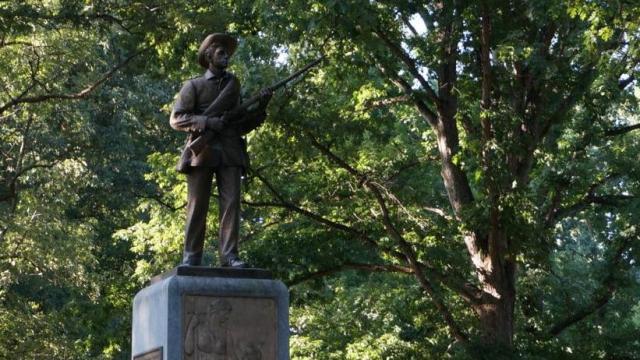Wednesday
One of my sons alerted me to the use of a Tennyson poem in a 1913 speech justifying the erection of the Silent Sam statue at the University of North Carolina-Chapel Hill, which students recently tore down. The publication of the speech by a North Carolina historian triggered the students.
Julian Carr’s speech should put to rest any doubts that Confederate statues were erected in the early 20th century to signal that whites were back in charge. While memorializing North Carolina students who died during the Civil War was one of the statue’s agendas, another was bolstering the mythology of the South’s “Lost Cause.” As southern racists saw it, the war had been a struggle to preserve a noble way of life against a rapacious north.
To this end, Carr leans heavily on the honor of southern womanhood, a common excuse for justifying violence against blacks (c.f. Emmitt Till). For southern whites, female purity elevates the War between the States to something higher than a battle over slavery. This is clear from the Carr anecdote that most angered the students:
I trust I may be pardoned for one allusion, howbeit it is rather personal. One hundred yards from where we stand, less than ninety days perhaps after my return from Appomattox, I horse-whipped a negro wench until her skirts hung in shreds, because upon the streets of this quiet village she had publicly insulted and maligned a Southern lady, and then rushed for protection to these University buildings where was stationed a garrison of 100 Federal soldiers. I performed the pleasing duty in the immediate presence of the entire garrison, and for thirty nights afterwards slept with a double-barrel shot gun under my head.
A version of this same dynamic plays out in D. W. Griffith’s Birth of a Nation, which would appear two years later. (Thomas Dixon’s The Clansman, on which the film is based, appeared eight years earlier.) Noble whites are forced to reassert control when blacks, who don’t know their place, threaten their women. In the film, one teenage girl jumps to her death rather than lose her honor to a renegade former slave, and a father is saved from having to shoot his daughter only because the KKK arrives just in time to rescue them from rampaging blacks.
The real issue, of course, is fear of blacks asserting their rights. Protecting women makes the fear seem noble, which is why Carr quotes a passage from Tennyson’s Princess. At this point in his speech, he is praising the fortitude of the women who supported the troops:
The war between the states was fought, really, by the women who stayed at home. Had they uttered a cry, had they complained, the morale of Lee’s army would have been dissipated in a day.
How many mothers were there in those days of stress and storm like her of that touching interlude of Tennyson’s?
Home they brought her warrior dead,
She nor swooned nor uttered cry;
All her maidens watching, said,
She must weep or she must die.
Then they praised him soft and low,
Called him worthy to be loved,
Truest friend and noblest foe,
Yet she neither spoke nor moved.
Stole a maiden from her place,
Lightly to her warrior stepped,
Took the face-cloth from the face,
Yet she neither moved, nor wept.
Rose a nurse of ninety years,
Set her child upon her knee,
Like summer tempest came her tears,
“Sweet my child, I live for thee.”
The tears point to the feelings that she has been covering up. Carr, meanwhile, can use the passage to indulge in self-pity. He can’t cry so this stoic woman cries for him.
Carr makes use of poetry to elevate the subject matter and scatters what I think is his own poetry through the talk. He also launches the speech with a stanza from Philip Stanhope Worsley’s poem about Robert E. Lee::
Thy Troy is fallen; thy dear land
Is marred beneath the spoiler’s heel;
I cannot trust my trembling hand
To write the things I feel.
The use of poetry and classical allusions further elevates the subject matter and reminds me of something Sewanee history professor Woody Register told me. The University of the South at Sewanee was established by slave owners with the intention of proving to the world that a slave society could establish a great university. The college was just getting started before the Civil War and never had had a chance to open until 1868, but it would play a role in establishing the nobility of the Lost Cause in the years to come. For instance, The Sewanee Review became an important vehicle for the Southern Agrarians.
Carr’s speech reveals that the Silent Sam statue is far from innocent. It is an example of people using the deaths of young people for their own political agenda.
Some things never change. We are seeing a current example as the rightwing uses the murder of 20-year-old college student Mollie Tibbetts to scapegoat all undocumented immigrants. Hispanics now share with African Americans an outsized sexual identity in the racist imagination.
Further thought: A review of a book on Agrarian poet Alan Tate, a one-time editor of Sewanee Review, has this to say about the use of poetry and culture to paper over the horrors of slavery and segregation:
As a vocal member of the self-styled Agrarians, and as author of the regional manifesto I’ll Take My Stand (1930), Tate developed his ideas without frankly acknowledging the South’s endemic legacy of racial strife. Rather than confront slavery for what it was—a defining stain on the southern psyche—he shrouded the issue in genteel appeals to classical objectivity. Rather than confront the documented reality that explained, say, the rise of Jim Crow, he turned to the Odyssey. Real history, and with it Tate’s generosity, swamped the noble dream he pursued for the southern identity.


